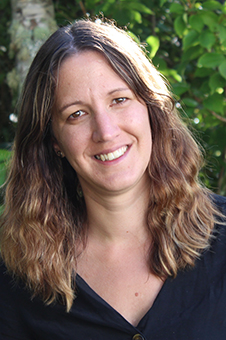Understanding the reasons behind the higher burden of epilepsy experienced by Māori children is the focus of a Health Research Council (HRC) funded research project at the University of Otago, Wellington, led by PhD student and paediatric registrar Dr Ngaire Keenan.

Dr Ngaire Keenan
Epilepsy affects about 4,000 children in New Zealand and Dr Keenan (Ngāti Te Whiti, Te Ātiawa ki Taranaki), says the condition has a disproportionate impact on Māori, who are more likely to be admitted to hospital and to visit emergency departments.
Dr Keenan is studying the health records of Māori children treated for epilepsy in 2015 under the Wellington, Wairarapa, Hutt Valley, Auckland and Northland District Health Boards as she works to piece together the causes of their epilepsy.
Dr Keenan says there has been very little research on epilepsy in New Zealand and even less on paediatric epilepsy or epilepsy in Māori. She hopes her two-year research project, funded by an HRC Clinical Research Training Fellowship will lead to a better understanding of the causes of epilepsy in Māori children and help in the development of new measures aimed at preventing children from developing epilepsy.
“We don't know what causes epilepsy in Māori children, but some will be related to preventable conditions, such as meningitis, traumatic brain injury or birth trauma. If meningitis is contributing to higher numbers of children developing epilepsy, for example, then we may need to develop better immunisation programmes.”
While children with epilepsy may live normal lives, almost a third will experience uncontrolled seizures and have poor outcomes.
Dr Keenan says it is the most common serious neurological disorder in childhood.
“Studies have shown that people with epilepsy are less likely to get a job, they can't drive, they are less likely to get married. It is associated with a lot of social discrimination.”
Dr Keenan will also review the medications and treatments prescribed to the Māori children in the study, to see if they are being referred to specialists at the same rate as non-Māori and if they are getting access to the right types of tests.
“It's vital that as well as trying to prevent epilepsy, we ensure those children who do develop epilepsy have access to good ongoing care.”
Dr Keenan plans to train as a paediatric neurologist and has a strong interest in Hauora Māori and is pleased to have the opportunity to work on research to improve health equity.
She hopes her research could lead to the development of more culturally appropriate health care for Māori children with epilepsy.
“It is really important to identify the cultural safety aspect of the health profession and make sure Māori children with epilepsy are getting high-quality care according to best practice.”
For more information, please contact:
Dr Ngaire Keenan
Department of Paediatrics and Child Health
University of Otago, Wellington
Email ngaire.keenan@postgrad.otago.ac.nz
Matiu Workman
Communications Adviser (Māori)
Mob +64 21 279 9139
Email matiu.workman@otago.ac.nz
Find an Otago Expert
Use our Media Expertise Database to find an Otago researcher for media comment.
